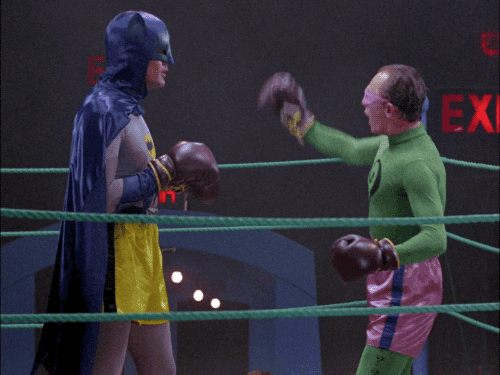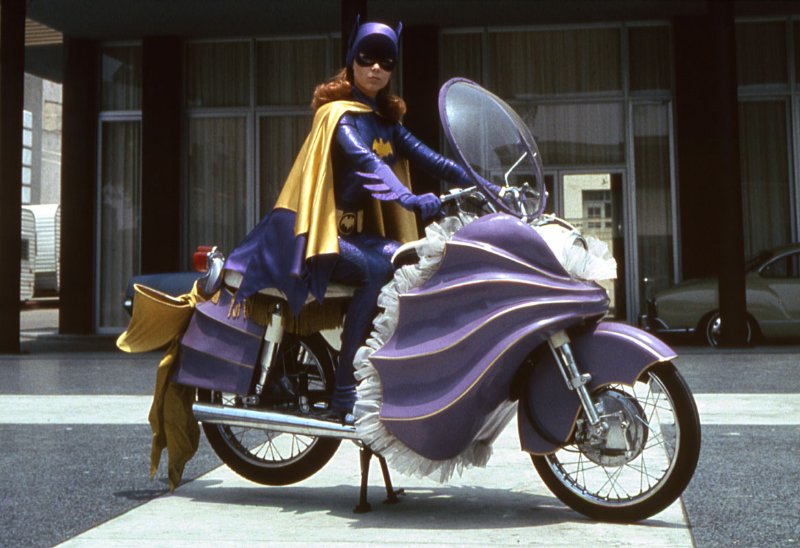In his study of the Batman TV show from last year, Matt Yockey argues that season three’s introduction of Batgirl (Yvonne Craig) carefully maintains patriarchal norms. Batgirl is always subordinate to Batman, Yockey says, and/or to her dad, Commisioner Gordon — or even to Alfred. “The implicit threat of the female crime fighter is contained by Alfred’s knowledge of her dual identities.” Batgirl gets to be somewhat heroic, but ultimately some guy in Gotham is always the boss.
This analysis fails to take into account one small fact. Namely, Season Three (or at least the first few episodes I’ve seen) is not an ordered hierarchy. Instead, it is a huge, staggering, lurching mess. The second episode in particular, with Frank Gorshin returning as the Riddler after a season long absence, teeters on the verge of utter incoherence, before plunging gleefully over the edge.
Seasons 1 and 2 followed a regular two-episode formula arc, from the introduction of the villain to the meeting with the commissioner through the cliffhanger to the escape and on to the defeat of the bad guy. But season three exchanges the two-parters for single episodes, and throws in the addition of Batgirl as an extra bonus crimefighter. The result is a plot that see-saws widely every which way. The Riddler pretends to be the prizefighter Mushi Nebuchudnezzer, drugs various prizefighters, wheels Joan Collins out as a super-villainness who sings a high-pitched note to mind-control other prizefighters, calls Batman a coward to lure him into a fight, uses magnets, tries to mind control Batgirl, fails, and connives with a sports reporter as the narrative veers back and forth between Batgirl running around and Batman and Robin running around, with a brief interlude for Dick Grayson’s aunt Harriet Cooper to explain that she’s been traveling abroad. The winking, knowing humor of the first two seasons dissolves into manic idiocy, summed up by Frank Gorshin bouncing and bobbing around the prize-fighting ring, looking punch-drunk one moment, walking into Batman’s fist the next, gleefully punching the magnetized Caped Crusader from behind in the third.
I guess it’s possible that the show’s creators were nervous about the threat of a female crime fighter and were trying to carefully maintain patriarchal order. But that’s not what happens. Instead, the introduction of Batgirl coincides with a show going utterly off the rails. Batman, who in earlier seasons has every answer at his bat-gloves’ finger-tips, now seems to be almost drowning in the whirlwind of plot. He doesn’t know who Batgirl is, and barely seems to know what he’s doing as he thrashes around in the ring with the Riddler until Batgirl demagnetizes him. In the next episode, (featuring Joan Collins again in a skirt so short it’s amazing it got past the censors) Batman, who has been resistant to the blandishments of all other villainnesses, has his Batbrain scrambled, and has to be rescued by Batgirl and Robin.
I wouldn’t say this is some sort of programmatic feminist message. But the first two seasons of Batman always carefully balanced celebrating the superhero as all powerful fuddy-duddy force of order and mocking him for being an all powerful fuddy-duddy force for order. In season three, the female crimefighter arrives, and the fuddy-duddy force for order experiences some sort of apocalyptic bat seizure. System disintegrates; super-villains profligately flock together, Bruce Wayne’s will, heretofore inviolable, is mushed by the exigencies of plot and the power of Joan Collins.
Most of the mix up is no doubt a simple the failure of capital, as cratering popularity and slashed budgets undermined the Wayne fortune and the shows’ shooting budget. But part of it is, too, the addition of that Domino Daredoll. Spending narrative time with the Batgirl-cycle may not topple the patriarchy, but it at least leaves it in massive disarray.


This is a perfect example of the kind of analysis I can only get from HU. Great pics, also.
Is there a link to the Yockey piece?
It’s a book! You can download it on Amazon.
I agree that the addition of Batgirl introduces an unstable element to the show–I just don’t see that as a bad thing (not that you necessarily do.) After two years of order, I find it both refreshing and amusing watching Batman and Robin try to figure out how they’re going to make this new trio work. The Dynamic Duo actually seem a bit more real and not just ironic constructs. I would compare it to The Purple Rose of Cairo, when Mia Farrow and Jeff Daniels walk into the movie-within-the-movie disrupting the narrative, causing one character to scream, a head waiter to jump in front of a band and start singing, etc. That’s kind of what happens when Batgirl arrives. Of course, Cairo writer/director Woody Allen may have more consciously sought such an effect than did the producers of Batman, but the results are similar.
None of this is meant as a total endorsement of season 3. Thanks to those slashed budgets you mentioned, the eye-popping sets are gone, often replaced with no sets at all, just pitch-black backgrounds. The jokes are less clever, broader, more obvious. And it looks like the show was trying, and failing, to capitalize on the then-burgeoning counterculture. In one episode the words BROOM CLOSET are written out in psychedelic letters.
But I still find Batgirl a bright spot amidst all that.
The incoherent mess of the third season doesn’t negate the show’s ideologically conservative approach to the introduction of Batgirl. My book doesn’t argue that maintenance of patriarchy motivated the addition of this character. In fact, I point out that the introduction of Batgirl was likely motivated by a desire to reinvigorate the show’s plummeting ratings and to expand the show’s merchandise base. But that ideological outcome remains, just the same.
Hey Matt. I don’t exactly agree, obviously. I think your claims about ideological outcomes tend to be a little too straightforward, for such a campy show? In this case, I don’t think it’s convincing to say that the ideological outcome is patriarchal stability when the season basically abandons its entire structure and descends into chaos.
In general, I thought your book tended to read conservative ideology into a show that was both upholding and sneering at conservative ideology pretty much all the time. You do point that out, of course, but you also seem to feel that conservative ideology wins out. I don’t think that’s the only possible reading.
I did like your book a lot though; very fun to think about and argue with.
Oh, and Kirk, I don’t think the incoherence is a bad thing at all! It’s a nice change of pace after the first two seasons, I think.
Noah, “both upholding and sneering at conservative ideology” is essentially the central argument of my entire book. Neither position could win out, which to a significant degree explains the show’s descent into pure incoherence in Season Three. My final chapter argues how the show’s campiness authorized all kinds of counter-hegemonic play. At any rate, thanks for your thoughts.